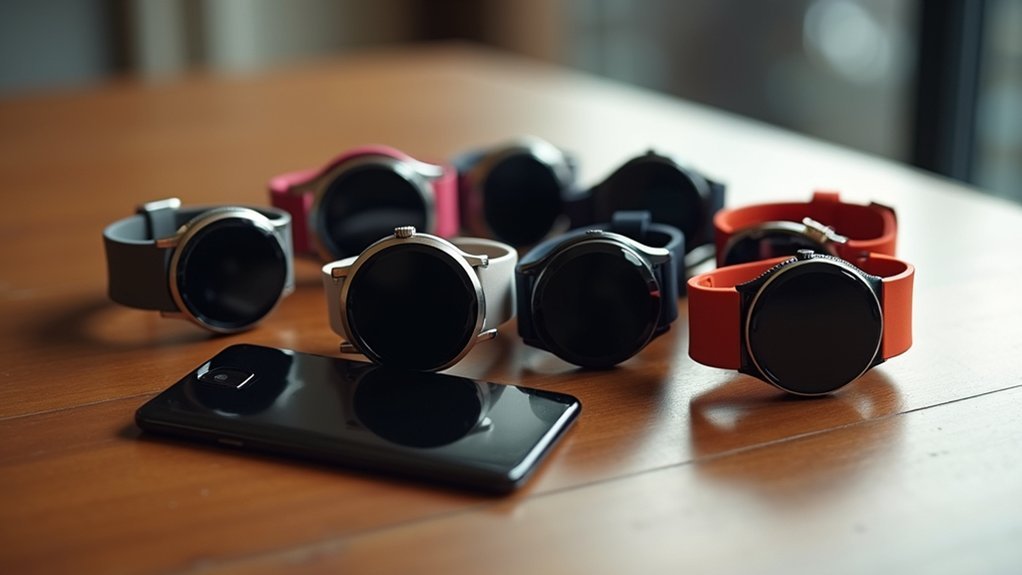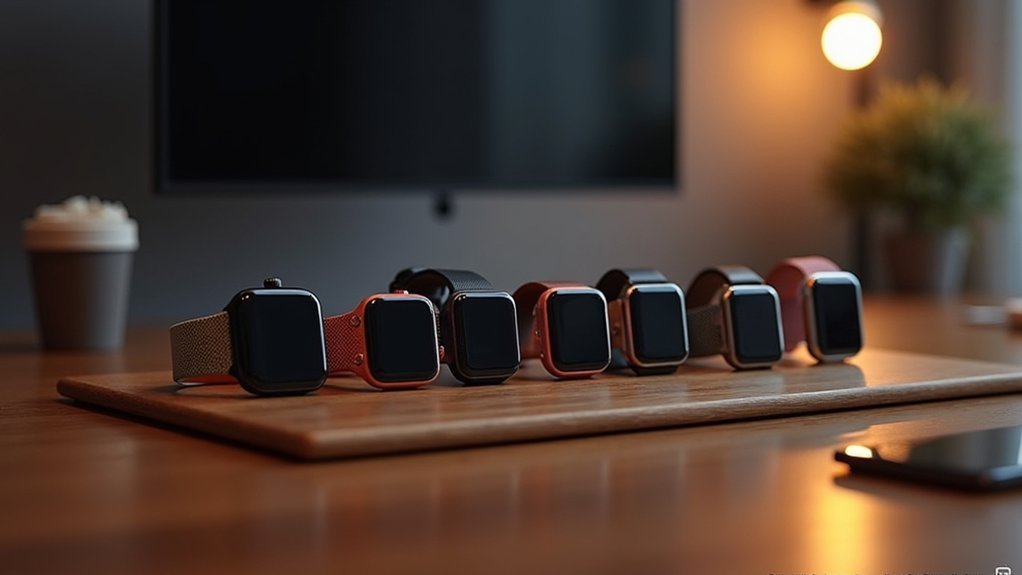You’ve likely noticed the growing importance of heart health monitoring in today’s smartwatches. ECG functionality has become a standout feature in both Fitbit and Garmin devices, offering medical-grade insights right from your wrist.
Whether you’re managing a heart condition or simply want thorough health data, these nine watches represent the cutting edge of what’s possible in 2025.
Let’s explore which device might give you the perfect balance of cardiac monitoring, fitness tracking, and everyday usability.
Fitbit Sense 2 Advanced Health and Fitness Smartwatch
Health enthusiasts seeking extensive cardiac monitoring will find the Fitbit Sense 2 particularly valuable. This smartwatch offers thorough heart health features including ECG for atrial fibrillation assessment and irregular heart rhythm notifications.
You’ll benefit from impressive battery life lasting over 6 days (12 hours with continuous GPS), plus quick charging that delivers 24 hours of use with just 12 minutes on the charger. The device tracks sleep quality, provides a daily Stress Management Score, and offers 40+ exercise modes.
While some users report occasional heart rate inaccuracies during intense workouts and touch interface issues, the customizable interface and robust health metrics dashboard make it a strong contender.
Best For: Health-conscious individuals who want comprehensive heart and stress monitoring along with extensive fitness tracking in a smartwatch with excellent battery life.
Pros:
- Offers advanced health monitoring features including ECG app, SpO2 tracking, and stress management tools
- Impressive battery life of over 6 days with quick charging capability (24 hours from just 12 minutes)
- Comprehensive fitness tracking with 40+ exercise modes, built-in GPS, and personalized sleep analysis
Cons:
- Some users report heart rate tracking inaccuracies during intense workouts
- Touch interface can be problematic, sometimes misinterpreting drags as taps
- Premium membership required for full feature access, with some advanced analytics only available during the 6-month trial period
Fitbit Charge 6 Fitness Tracker with Google Apps (Obsidian/Black)
The Fitbit Charge 6 delivers extensive health monitoring in a sleek, compact design while offering seamless integration with Google apps. You’ll track calories, Active Zone Minutes, sleep patterns, and Daily Readiness using its 40+ exercise modes and built-in GPS.
While it connects to exercise machines for real-time heart rate monitoring and supports YouTube Music, Google Maps, and Google Wallet, it won’t sync with Apple’s Fitness app.
Users report mixed experiences with accuracy and battery life—some find calorie estimates too high and need frequent charging despite the “week-long” claim. The included 6-month Premium membership enhances your health insights.
Best For: Health-conscious individuals who want comprehensive fitness tracking with Google app integration in a compact device that monitors multiple health metrics and exercise activities.
Pros:
- Extensive health monitoring capabilities including sleep stages, 40+ exercise modes, and heart rate tracking
- Built-in GPS and automatic exercise tracking for convenience during workouts
- Seamless integration with Google apps including Maps, Wallet, and YouTube Music controls
Cons:
- Inconsistent accuracy in distance tracking and calorie measurements according to user reports
- Battery life may not meet the advertised week-long duration, requiring more frequent charging
- Lacks compatibility with Apple’s Fitness app, limiting functionality for iOS users
Google Pixel Watch 3 Smartwatch with Fitness Tracking (45mm)
Google’s Pixel Watch 3 represents a significant upgrade in the smartwatch market, offering Fitbit’s advanced health features in a sleek 45mm design that’s ideal for Android users seeking thorough ECG monitoring.
The new Actua display delivers twice the brightness and 40% more screen space than previous models, making health data easier to read. You’ll appreciate the thorough fitness tracking, including readiness assessments that analyze sleep quality and heart rate variability.
With 24-hour battery life and seamless integration with Google’s ecosystem, you can control your Nest devices or use Pixel Buds while monitoring your cardiovascular health. Though casual users love its 4.4-star rating, serious athletes might still prefer Garmin alternatives.
Best For: Android smartphone users (especially Pixel owners) who want a premium smartwatch with comprehensive fitness tracking and seamless Google ecosystem integration.
Pros:
- Impressive display improvements with 40% larger screen and twice the brightness for better visibility
- Advanced health metrics including readiness tracking, cardio load measurement, and comprehensive sleep analysis
- Seamless integration with Google ecosystem devices like Pixel Buds and Nest smart home products
Cons:
- Limited to Android 10.0 or newer compatibility, excluding iPhone users entirely
- 24-hour battery life may require daily charging, which could be inconvenient for some users
- Serious fitness enthusiasts or athletes might find more specialized features in competitor brands like Garmin
Garmin Venu 3 Smart Watch with 45mm Case
Designed for serious fitness enthusiasts who demand extensive health tracking, the Garmin Venu 3 Smart Watch with its elegant 45mm case delivers exceptional performance in a stylish package. The slate stainless steel bezel surrounding its vibrant 1.4-inch AMOLED touchscreen creates a premium aesthetic that’s as functional as it is attractive.
You’ll appreciate the impressive 14-day battery life that outperforms many competitors. The extensive health features include accurate heart rate monitoring, sleep tracking, and Body Battery™ energy monitoring. With built-in GPS, animated workouts, and smartphone integration, this 1.6-ounce lightweight companion provides everything you need for fitness tracking while maintaining excellent durability for daily wear.
Best For: Fitness enthusiasts and active individuals seeking a comprehensive health tracking smartwatch with exceptional battery life, extensive workout features, and premium design.
Pros:
- Impressive 14-day battery life significantly outperforms most competing smartwatches
- Comprehensive health monitoring features including accurate heart rate tracking, sleep analysis, and Body Battery™ energy monitoring
- Durable yet lightweight design (1.6 ounces) with a vibrant 1.4-inch AMOLED touchscreen display
Cons:
- Higher price point compared to basic fitness trackers
- Some users report occasional tracking inaccuracies
- Limited app ecosystem compared to Apple Watch and other mainstream smartwatches
Garmin fēnix 8 Premium Multisport GPS Smartwatch (51mm)
Adventure seekers and endurance athletes will find their perfect companion in the Garmin fēnix 8, a premium multisport powerhouse that combines rugged durability with advanced health monitoring.
This 51mm titanium-bezeled marvel features an AMOLED display with sapphire lens protection and impressive 40-meter dive rating. You’ll appreciate the built-in LED flashlight and leakproof buttons during outdoor excursions.
Battery life is exceptional—up to 29 days in smartwatch mode or 84 hours using GPS. The multi-band GPS with SatIQ technology guarantees pinpoint accuracy, while 32GB storage holds your music and maps.
Take calls directly from your wrist using the built-in speaker and mic when paired with your smartphone.
Best For: Serious athletes, adventurers, and outdoor enthusiasts who need comprehensive fitness tracking, advanced navigation capabilities, and rugged durability in a premium smartwatch.
Pros:
- Exceptional battery life with up to 29 days in smartwatch mode and 84 hours in GPS mode
- Premium construction with titanium bezel, sapphire lens, and 40-meter water resistance
- Comprehensive suite of fitness tracking, navigation tools, and smart features including built-in speaker and microphone
Cons:
- Relatively large 51mm size may be too bulky for users with smaller wrists
- Premium features come with a premium price point
- Some users report concerns with heart rate accuracy and sleep tracking metrics
Garmin epix Pro (Gen 2) Sapphire Edition High Performance Smartwatch
The Garmin epix Pro (Gen 2) Sapphire Edition stands as a premium choice for serious athletes who demand precision and durability in their wearable tech. Its 1.4″ AMOLED display paired with a scratch-resistant sapphire lens and titanium bezel offers both functionality and elegance.
You’ll appreciate the advanced health metrics including HRV status and thorough sleep tracking. The innovative hill score and endurance score features provide deeper insights into your training performance. With multi-band GNSS technology and built-in TopoActive maps, you’ll navigate with confidence during outdoor adventures.
While it lacks call capabilities, its impressive battery life and 4.7/5 user rating justify the investment.
Best For: Serious athletes and outdoor enthusiasts who prioritize advanced fitness metrics, precise navigation capabilities, and premium build quality in a smartwatch with extended battery life.
Pros:
- Exceptional durability with scratch-resistant sapphire lens and titanium bezel, perfect for rugged outdoor activities
- Advanced training features including hill score, endurance score, and detailed navigation with multi-band GNSS technology
- Impressive battery life that lasts weeks in smartwatch mode, minimizing charging interruptions
Cons:
- Lacks microphone and speaker functionality for taking calls directly from the watch
- High price point may be prohibitive for casual fitness enthusiasts
- Steep learning curve for navigating and fully utilizing all the advanced features and settings
Garmin Tactix 8 Premium Tactical GPS Smartwatch
Military personnel, tactical operators, and outdoor enthusiasts seeking rugged durability with health monitoring will find the Garmin Tactix 8 exceeds expectations. This premium tactical GPS smartwatch boasts a 1.4″ solar-charged display with titanium bezel and sapphire lens.
You’ll appreciate the built-in LED flashlight for low-light situations and specialized features like jumpmaster activity, stealth mode, and kill switch. The watch supports night vision compatibility and includes a preloaded Applied Ballistics solver.
Battery life is impressive – up to 48 days in smartwatch mode with solar charging. With multi-band GPS, SatIQ technology, and 40-meter water resistance, it’s built for extreme conditions.
Best For: Military personnel, tactical operators, and serious outdoor enthusiasts who require advanced navigation, extreme durability, and specialized tactical features in a premium GPS smartwatch.
Pros:
- Exceptional battery life with up to 48 days in smartwatch mode with solar charging
- Specialized tactical features including jumpmaster activity, stealth mode, and night vision compatibility
- Robust construction with titanium bezel, sapphire lens, and 40-meter water resistance
Cons:
- Premium price point makes it a significant investment
- Complex feature set may be overwhelming for casual users
- Size and weight may be bulky for everyday wear or smaller wrists
Garmin Enduro 3 Solar GPS Smartwatch with Titanium Case
Ultra-endurance athletes seeking unparalleled battery life will find their match in Garmin’s Enduro 3 Solar GPS Smartwatch. This lightweight titanium powerhouse weighs just 63 grams while delivering an astounding 90 days in smartwatch mode or 320 hours with GPS activated.
You’ll appreciate the carbon gray DLC titanium bezel with scratch-resistant sapphire lens, complemented by a comfortable UltraFit nylon strap. The 1.4-inch display houses advanced features including preloaded TopoActive maps, real-time stamina tracking, and a built-in LED flashlight for night visibility.
The improved solar charging system works even indoors, making this the ultimate choice for athletes who prioritize battery life over smart features.
Best For: Ultra-endurance athletes, long-distance adventurers, and outdoor enthusiasts who prioritize exceptional battery life and durable construction over smart connectivity features.
Pros:
- Exceptional battery life with up to 90 days in smartwatch mode and 320 hours in GPS mode with solar charging
- Lightweight titanium construction (63g) with scratch-resistant sapphire lens makes it comfortable for extended wear
- Advanced training features including preloaded TopoActive maps, real-time stamina tracking, and a built-in LED flashlight
Cons:
- Limited smart functionality compared to other smartwatches (lacks voice features, text response capabilities)
- Initial setup complexity may present a learning curve for some users
- Fewer watch face options available compared to other Garmin models
Garmin D2 Air X10 Touchscreen Aviator Smartwatch with GPS
Designed specifically for pilots, the Garmin D2 Air X10 combines aviation functionality with extensive health tracking in a sleek package. The bright AMOLED touchscreen displays critical aviation data including METARs, TAFs, and runway information when paired with your smartphone.
You’ll appreciate the automatic flight logging and worldwide aeronautical database while monitoring your blood oxygen levels with the Pulse Ox sensor—particularly valuable at altitude. The watch offers 25+ sport apps and music storage with up to 7 days of battery life.
While it lacks ECG functionality, its aviation-specific features make it ideal for pilots who prioritize flight data over advanced heart monitoring.
Best For: Pilots and aviation enthusiasts who need specific flight data and health tracking features in a smartwatch that can integrate with their flying activities.
Pros:
- Comprehensive aviation features including weather reports, aeronautical database, and automatic flight logging
- Bright AMOLED touchscreen with up to 7 days of battery life in a lightweight design
- Combines pilot-specific tools with robust health tracking and 25+ sports apps
Cons:
- Limited smartwatch functionality compared to competitors, particularly in app support and text response capabilities
- Charging solution is inconvenient and requires careful placement to avoid damage
- Some users report issues with screen durability and accuracy of certain features like golf course mapping
Factors to Consider When Choosing a Fitbit or Garmin With ECG
When selecting a Fitbit or Garmin with ECG functionality, you’ll need to compare several critical factors beyond just the presence of the feature. You should examine each device’s ECG accuracy ratings, battery life impact, medical certification status, and data integration capabilities with your existing health apps. These considerations will help you choose a wearable that not only monitors your heart rhythm effectively but also fits seamlessly into your lifestyle and health management system.
Factors to Consider When Choosing Fitbit & Garmin With ECG
Selecting the right ECG-equipped Fitbit or Garmin extends beyond merely choosing a device with this feature. You’ll need to evaluate the ECG function’s accuracy during various activities, as some devices show discrepancies during vigorous exercise.
Check the health metrics dashboard thoroughness, including irregular heartbeat notifications and SpO2 monitoring for complete health tracking. Verify compatibility with your smartphone and preferred fitness apps to guarantee seamless synchronization.
Battery life deserves careful attention, especially how ECG usage alongside other tracking features affects overall longevity. Many users report faster depletion when ECG is frequently utilized.
Finally, consider whether the device offers premium membership options that provide personalized insights based on your ECG readings, potentially enhancing your health monitoring experience with advanced analytics and interpretation.
ECG Accuracy Ratings
ECG accuracy stands as the cornerstone of any wearable health monitoring device’s value. When comparing Fitbit and Garmin models, you’ll find sensitivity and specificity rates typically ranging from 85% to 95% for atrial fibrillation detection.
Your usage habits directly impact readings—proper skin contact and minimal movement during recording are essential for reliable results. Models featuring advanced machine learning algorithms generally deliver more dependable data by better distinguishing between normal rhythms and arrhythmias.
Be aware that environmental conditions like temperature and moisture can compromise sensor performance. For ideal accuracy, choose devices with regular software updates, as manufacturers continuously refine their algorithms based on expanding user databases.
Remember that even the best consumer ECG wearables require proper calibration to maintain their accuracy over time—a critical consideration when making your selection.
Battery Life Impact
Although ECG functionality delivers powerful health insights, it considerably affects how long your device will run between charges. When you’re regularly monitoring your heart health, battery consumption increases dramatically compared to basic tracking functions.
Fitbit Sense 2 offers over 6 days of typical use, but expect this to decrease when you’re frequently using ECG alongside other health features. For extended performance, Garmin stands out—the Enduro 3 can last up to 90 days in smartwatch mode, making it ideal if you need consistent heart monitoring without frequent recharging.
Consider how often you’ll actually use ECG monitoring. If you’re checking your heart rhythm daily, prioritize devices with robust battery performance. Your usage patterns matter—many users report significant battery depletion when combining ECG with other advanced tracking features.
Medical Certification Status
Beyond battery performance, medical certification status represents a critical differentiator between various ECG-equipped wearables. When evaluating Fitbit and Garmin watches with ECG functionality, you’ll want to verify if the device has received FDA clearance or similar approvals from regulatory authorities in your region.
These certifications aren’t just bureaucratic formalities—they confirm the device has undergone rigorous clinical validation for detecting conditions like atrial fibrillation with medical-grade accuracy. Both Fitbit and Garmin must demonstrate their ECG features meet strict standards for safety and effectiveness across diverse user populations.
Remember that certification status can change over time as manufacturers release software updates. Before making your purchase, check the manufacturer’s website for the most current information about your chosen model’s medical certifications and regulatory approvals.
Data Integration Capabilities
When evaluating Fitbit and Garmin watches with ECG functionality, you’ll need to contemplate how effectively they integrate collected health data into your broader digital ecosystem. Both manufacturers offer varying levels of compatibility with platforms like Google Fit and Apple Health, which can consolidate your health metrics in one convenient location.
Consider whether the device allows you to export ECG readings in formats your healthcare provider can easily access. The best models seamlessly sync this cardiac data alongside other health metrics into thorough dashboards within their companion apps. This integration enables you to track patterns over time and receive personalized insights.
Look for watches that provide real-time notifications based on your ECG readings, potentially alerting you to irregular heart rhythms that warrant attention. Effective data integration transforms isolated measurements into actionable health intelligence.
Frequently Asked Questions
Can ECG Features Detect Heart Attacks or Other Serious Cardiac Conditions?
ECG features can detect irregular heart rhythms like atrial fibrillation, but they can’t reliably identify heart attacks or serious cardiac conditions. You’ll need professional medical equipment for accurate diagnosis of those severe heart events.
Are ECG Readings From Smartwatches as Accurate as Medical-Grade ECG Machines?
No, your smartwatch’s ECG isn’t as accurate as medical-grade machines. While they can detect some irregularities, they’re limited to single-lead readings compared to clinical 12-lead ECGs that provide more thorough cardiac assessment.
How Often Should I Perform an ECG Scan With My Smartwatch?
You should perform ECG scans when you feel symptoms like palpitations or dizziness. For general monitoring, once monthly is reasonable, but follow your doctor’s recommendations if you have known heart conditions.
Can Children or Teenagers Safely Use the ECG Function?
ECG functions on smartwatches aren’t designed for children or teenagers. They’re typically FDA-cleared for adults 22+ years old. If you’re concerned about your child’s heart health, it’s better to consult a pediatrician instead.
Will ECG Features Work if I Have a Pacemaker or Other Cardiac Device?
If you have a pacemaker or cardiac device, ECG features might not work accurately or could interfere with your medical equipment. Always consult your cardiologist before using these consumer-grade ECG functions with implanted devices.





Leave a Reply